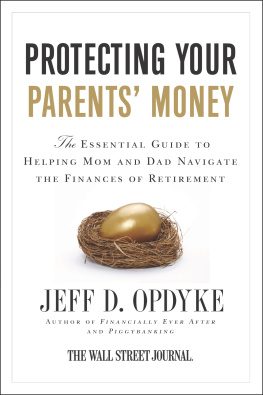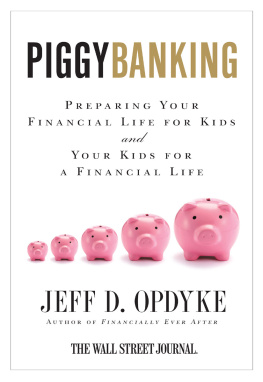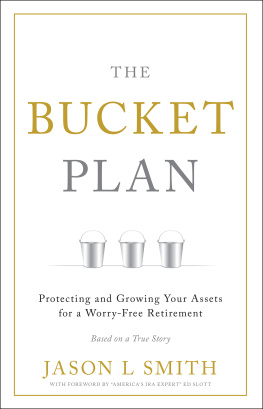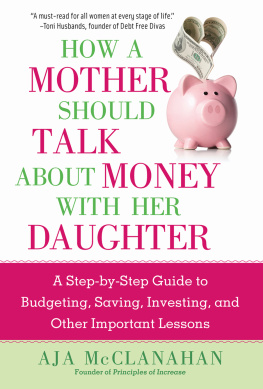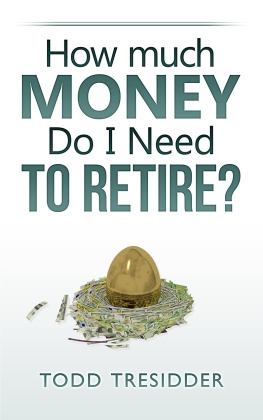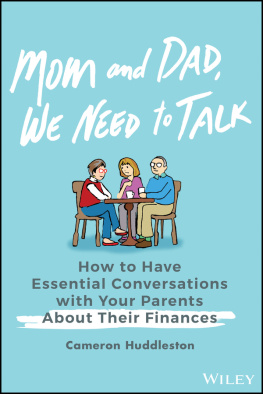Protecting Your Parents Money
The Essential Guide to Helping Mom and Dad Navigate the Finances of Retirement
Jeff D. Opdyke

To Amy, Zachary, and Nicole
for putting up with yet another of my book projects.
I love you.
Contents
T HERE IS A REASON you picked up this book. Likely its because youre over the age of thirty-five and you are facing a situation few adult children want to face, much less know how to deal with: having to parent your parents financially because theyve reached or are quickly reaching an ageeither physically or mentallywhere they can no longer do so themselves.
Some of you are scrambling for answers now, having been thrown into this situation unexpectedly. Others are feeling less pressured, though no less concerned, because while youre not yet enveloped in the tempest you nevertheless see exactly whats coming. You want the answers to your questions before the issues arrive.
Whatever your particular situation, youve found the right book. In these pages you will learn what you need to know to help Mom or Dad or both navigate the finances of agingfrom understanding nursing homes and how to pay for them to the pros and cons of annuities and structuring a stream of income to live on in retirement, and from understanding what Medicare and Medicaid do and dont cover to collecting Social Security benefits and calculating whether or when a reverse mortgage makes sense as a financial option.
But before we begin with all that, know this: You are not alone. In fact, youre part of quite a large crowd of people, all across the country, struggling with many of the very same issues and questions swirling around your head. Roughly a quarter of all U.S. households are providing some form of care to a relative over the age of fifty, according to the National Alliance for Caregiving. A USA Today/ABC News/Gallup poll found that 41% of baby boomers with a living parent were caring for that parent in some fashion. Numerous other polls and surveys found much the same results.
Whatever the actual number, some of the care being provided clearly falls into the broad category of personal and/or family financebe it paying Moms bills or helping Dad shop for a long-term care policy.
Chances are you dont know everything you need to know to effectively guide a parent through the decisions that need to be made.
Indeed, for millions of people dealing with an aging parent, the answers dont come easily. Many of the underlying topics are complicated and so heavily nuanced that there can be no one-size-fits-all solution, or even a one-size-fits-many solution. Often each answer is as unique as each family.
To that end, this book doesnt set out to provide you with a personalized, turn-by-turn guide for each challenge youre likely to face with aging parents. Too many permutations exist to make that feasible.
Instead, this book offers a broad road map for navigating the issues that arise. Some of the advice youll find in these pages you can easily take on yourself. But a big part of parenting your parents is knowing not only what you do know, but knowing what you dontand how to find the experts you need or how to tap into the various resources that exist to help you help Mom/Dad.
Either way, the information in this book aims to make you a better advocate for and protector of your parents. To put you in the right frame of mind: Think back on how you felt as a young kid, when your parents had all the answers (or at least seemed to). Thats the role youre called to play when you step in to parent your parents through the last phase of life. You are now the one with all the answers.
Thus, my job in this book is to help you:
understand what you need to know about the topics that are germane to parenting your parents, and where its appropriate I will explain some of the tricks you need to be aware of in order to make helping your parents easier on you;
locate the assistance and services you need in whatever state your parent lives in; and
provide tips along the way for more easily and more effectively parenting your parents financially.
Throughout the book, Ive included Conversation Starters that you can use verbatim to start these tough, sometimes painful conversations with your parents. If you dont like my language, or if it sounds wrong for your parents, no worries, tweak it however you see fit. Its in here just to give you a general sense of what you need to say and how.
Youll also find a lot of terms in this book that Ive placed in bold type. These are the words youll find in the Terms to Know section of the appendix, in case youre not familiar with the word or the concept it defines. If you dont need this refresher, great, youre already ahead of the game. However, I understand that not everyone has had the best personal finance education. And thats OK, too. The important fact is that youre stepping in to help your parents, and to make that as easy as possible. Im including the Terms to Know section as a quick reference to help you.
So its time to finally address those worries you have inside. The first step in the process starts on the next pagelearning to communicate with Mom/Dad. Its the most important step in the process youre about to begin.
Chapter 1
The Talk
T HIS IS THE SINGLE most important chapter in this book. I placed it first in line for one overarching reason: Just about everything else you will read in these pagesand all your efforts at helping Mom and Dad manage or deal with the financial aspects of agingwill work out so much easier for you and your family if you first learn to communicate with your parents.
Everybody thinks they know how to communicate because, well, weve all spent thirty or forty or fifty years or more expressing our thoughts and feelings and emotions. Weve learned how to talk to one another. So, really, how difficult can chatting with parents be? Just ask the questions for which you want answers and then catalog what Mom and Dad say.
Good luck with that.
I promise that for many, many families the necessary answers wont be that easy to pry loose. Just as you are likely quite private with your own finances, your parents are just as private with theirs. They easily could look suspiciously on your unexpected queries about their money, what they spend their Social Security checks on, where their bank accounts are located, and their plans for distributing an estate when they pass on. As such, dont be surprised when Mom or Dad or both delicately or brusquely brush aside your advances, stall providing adequate answers, or even express outright worry or anger over perceptions that you might be out to wrest control of their financial freedom or, worse, rob them of their assets before theyre dead. Dramatic? Yes. However, the news in the last decade or so has been filled with so many sad tales of elderly victims of financial abuse, statistically perpetrated most often by a family member, that aging parents at times cant help but question a childs intentions. In short, Mom and Dad, at least in their own minds, have real reason to fear your unwanted intrusion into their personal financial lives. As a result, the answers you want arent always as forthcoming as you might expect.
And those parents who do want to talk, meanwhile, the ones who implicitly trust their children and want their kids involved in making the big and small decisions of old age, dont always know how to tell you what they want to say for fear that you dont want to hear it. They dont know how to ask the questions that have them concerned, and they worry theyll be thought of as stupid or financially incompetent. Sometimes they simply dont know how to begin the conversation.
Next page
